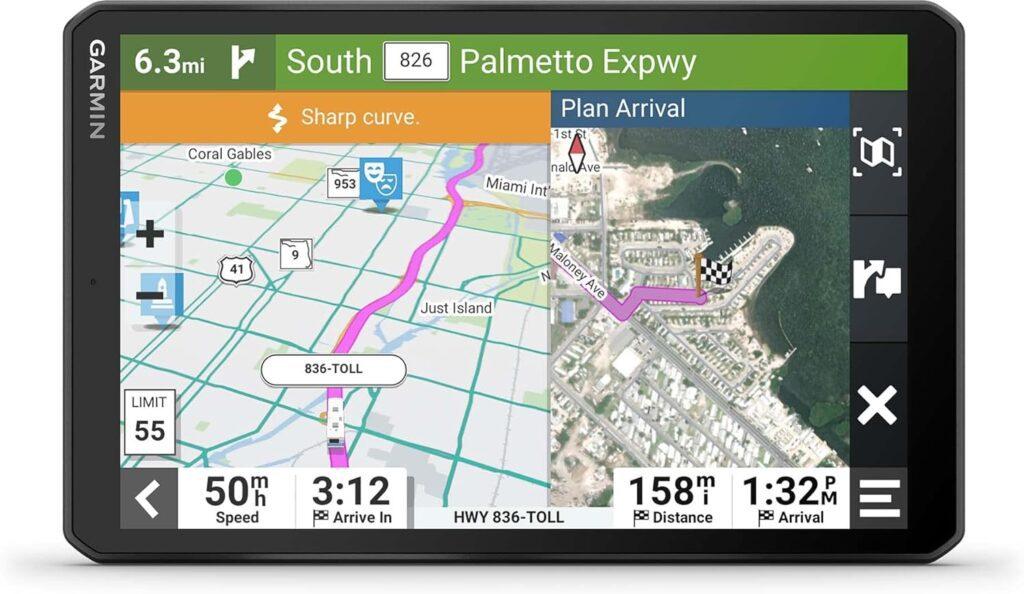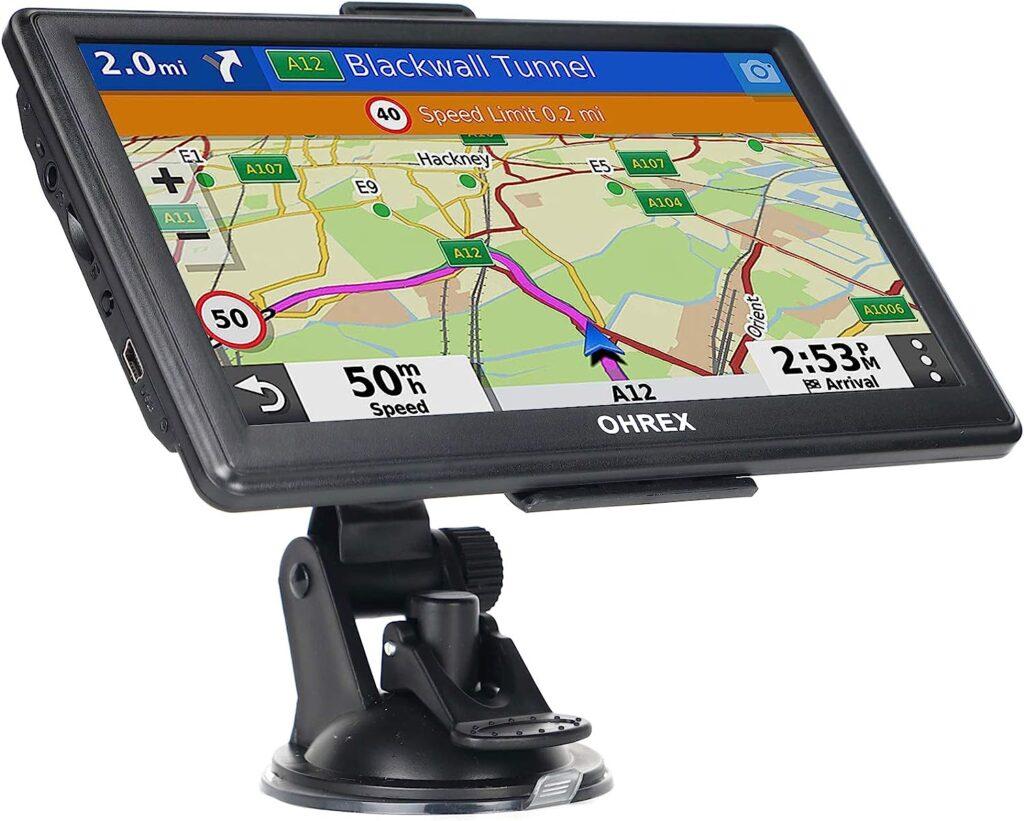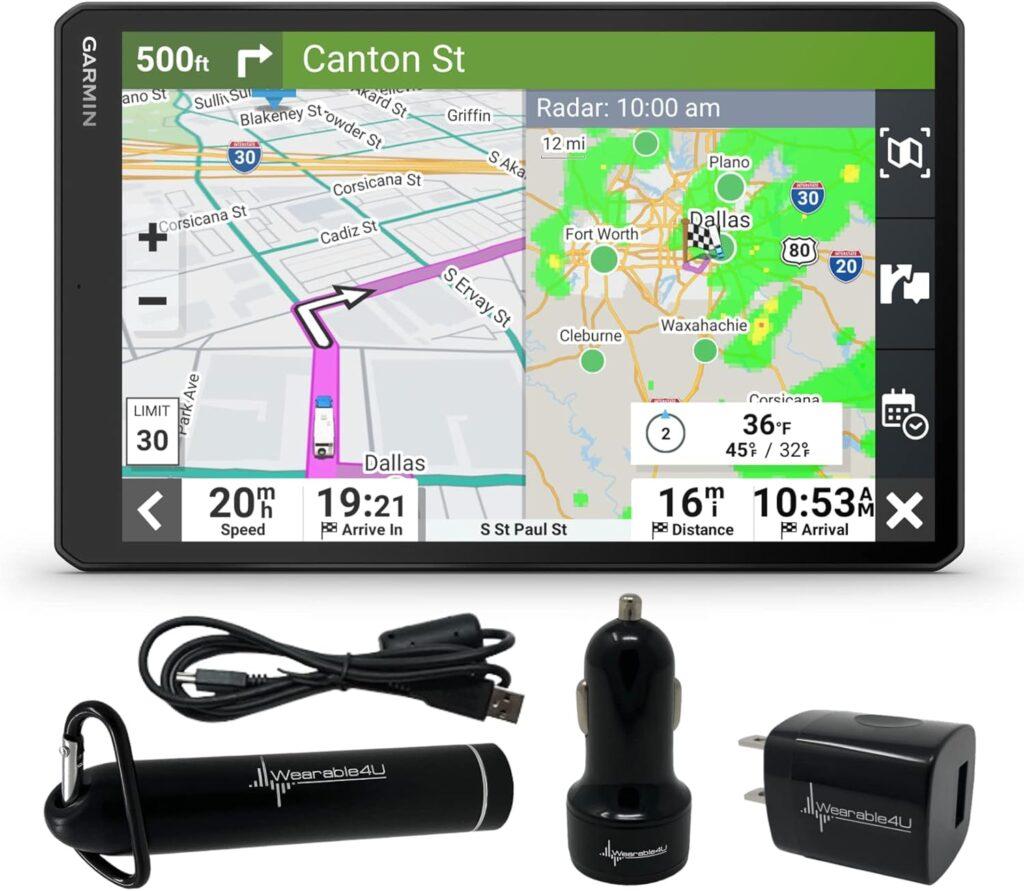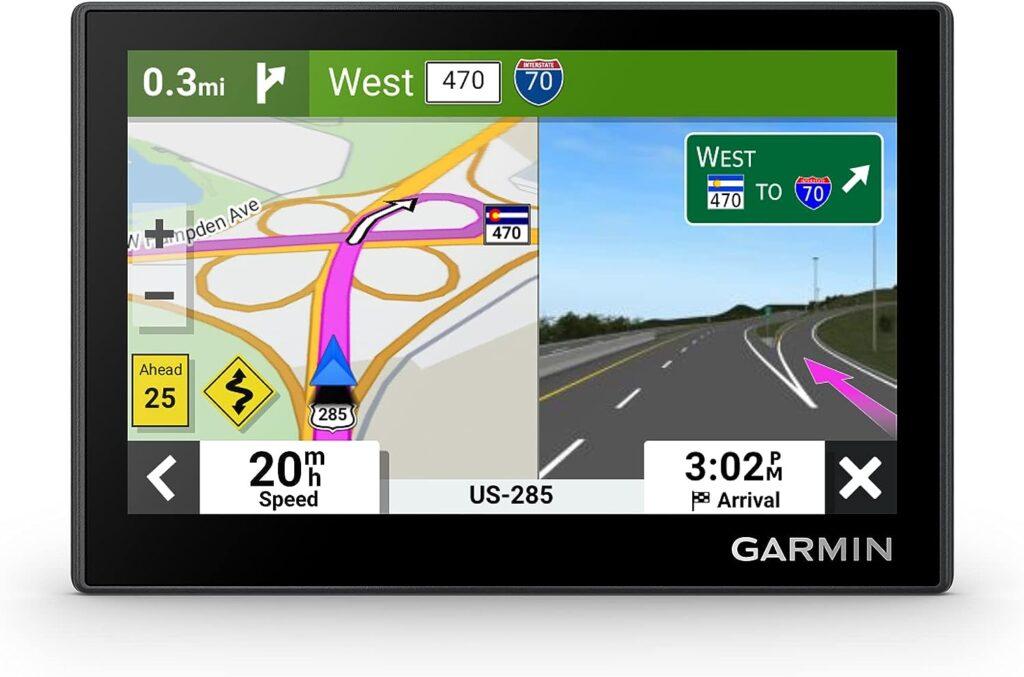Traveling in an RV offers adventure and freedom, yet poses distinctive challenges, particularly in navigation. That’s where the role of GPS navigators becomes crucial. For RVers, a reliable GPS navigator isn’t just a tool; it’s a travel companion that guides through unfamiliar terrains and ensures a smooth journey. These navigators are specially designed to cater to the distinct needs of RV travel, taking into account the size, restrictions, and specific route requirements of motorhomes. In this guide, we have extensively researched, reviewed, and ranked the 5 best RV GPS navigators for precise direction with camper van life journey in 2024. This ensures you can choose the right GPS navigators for your RV from the many choices.
We’re reader-supported. When you buy through links on our site, we may earn an affiliate commission. As an Amazon Associate, we earn from qualifying purchases.
Our Top Picks For The 5 Best RV GPS Navigation System for Flawless Camper Van Route Guidance Adventures In 2024
1. Best Overall: Garmin RV 895
2. Best Budget-Friendly Option: OHREX N700
3. Best Large Screens Option: Garmin RV 1095
4. Best Traffic Updates Option: Garmin Drive 53 with Traffic
5. Best Value Option: Garmin RV 795
What Is The Best RV GPS Navigator for Effortless and Reliable Journeying?
Going on an RV adventure, the right GPS navigator is a game-changer. It transforms complex routes into clear, manageable journeys. Let’s dive into the world of RV GPS navigators and discover the top picks that cater perfectly to the unique needs of RVers. These selections help you to make your travels more easier and enjoyable.
1. Best Overall: Garmin RV 895

Quick Specifications
- Dimensions: 7.9 x 4.9 x 0.8 inches
- Communication: Bluetooth, Wi-Fi
- Display: 8” touchscreen, 1280 x 800 resolution
- Special Features: Custom RV routing, Live Traffic and Weather, RV Parks Directory, Birdseye Satellite Imagery
- Included in Box: RV 895, Suction Cup Mount, Power Cable, USB Cable, Documentation
As we ventured into exploring the Garmin RV 895, we found it to be a standout in the realm of RV navigation. It’s not just a GPS; it’s a travel companion tailored for RVs. The large 8-inch display, which you can view in either landscape or portrait mode, offers excellent visibility and easy route monitoring. What really sets it apart is its custom RV routing, considering the size and weight of your RV, ensuring you’re always on the right path.
Furthermore, the preloaded directory of RV parks and services is a game-changer. It’s like having a knowledgeable co-pilot, guiding you to the right spots, complete with TripAdvisor traveler ratings. The high-resolution Birdseye Satellite Imagery makes arriving at your destination a breeze, giving you a clear aerial view of the surroundings. Plus, the live traffic and weather updates keep you informed and prepared for the road ahead.
Pros
- Choose between landscape or portrait view for your convenience.
- Includes ratings and suggestions for parks and services.
- Tailored routes based on your RV’s dimensions and weight.
- Live updates for traffic, weather, and road warnings.
Cons
- Custom routing may not be available everywhere.
- A bit on the expensive side, but worth the investment for frequent RVers.
The Garmin RV 895 emerges as the overall RV GPS Navigator for its comprehensive features tailored specifically for RV travel. The high-resolution display, reliable custom routing, and extensive directory of services make it an indispensable tool for RV enthusiasts. It’s not just about getting from A to B; it’s about enriching your travel experience with safety, convenience, and informed choices. This is why the Garmin RV 895 stands out as the top choice for RV GPS navigators.
2. Best Budget-Friendly Option: OHREX N700


Quick Specifications
- Dimensions: 6.77 x 4.37 x 0.63 inches
- Battery: 1 Lithium Polymer (included), 2 hours life
- Display: 7 inches, 800×480 resolution
- Connectivity: USB
- Special Features: Custom Truck Routing, Lifetime Map Updates, Lane Assist
- Included: GPS Navigation, Car Charger, USB Cable, Suction Cup Mount, User Manual
Exploring the OHREX N700 has been a revelation in budget-friendly GPS navigation for RVs. Its easy to follow routes and read instructions with 7-inch crisp and clear screen. We were particularly impressed with the lifetime free map updates, ensuring that you always have the most current information at your fingertips. Its ability to customize routes based on vehicle size and weight makes it an excellent choice for RVers looking for a tailored navigation experience.
Moreover, the OHREX N700 offers a variety of driver alerts and features like lane assist, which significantly enhances driving safety and convenience. The system’s intuitive interface makes it user-friendly, even for those who are not tech-savvy. Plus, its pre-loaded maps of North America including Canada, Mexico, and the USA add to its extensive coverage.
Pros
- Offers great features without breaking the bank.
- Easy to navigate menus and clear instructions.
- Tailors routes to your vehicle’s specifications.
- Keeps the device current without extra cost.
Cons
- Limited to 2 hours, might require frequent charging.
- Compatibility limited to Windows systems for map updates.
In our opinion the OHREX N700 stands out as the right budget-friendly RV GPS navigator on our list. Its combination of affordability, user-friendly design, and practical features make it an ideal choice for RVers on a budget. While it has some limitations, such as shorter battery life and Windows-only compatibility for updates, these do not significantly detract from its overall value and functionality. For those looking for reliable navigation without a hefty price tag, the OHREX N700 is a top choice.
3. Best Large Screens Option: Garmin RV 1095


Quick Specifications
- Weight: 3.85 pounds
- Dimensions: 12.13 x 8.35 x 4.69 inches
- Battery: 1 Lithium Ion (included)
- Display: 10 Inches touchscreen
- In the Box: Garmin RV 1095 Navigator, Suction Cup Mount, Power Cable, CLA Adapter, Wearable4U E-Bank, Car and Wall Chargers
When we explored the Garmin RV 1095 GPS Navigator, its large 10-inch screen immediately stood out. This extra-large display ensures easy viewing of routes, which is a significant advantage when navigating complex RV trips. The high-resolution touchscreen, which works both in landscape and portrait mode. This offers a clear and detailed view of your journey.
Furthermore, the Garmin RV 1095 excels in providing custom routing for RVs based on size and weight, ensuring safer and more efficient travel. The inclusion of BirdsEye Satellite Imagery is particularly impressive, offering vivid aerial views that greatly aid in navigating to RV parks and campgrounds. The comprehensive directory of RV services and points of interest, along with TripAdvisor traveler ratings, enhances the travel experience, making it easier to find the right spots and activities along your route.
Pros
- Easy route viewing on a 10-inch screen.
- Tailored navigation based on RV dimensions.
- Includes parks, services, and traveler ratings.
- Vivid aerial views for easier navigation.
Cons
- Slightly heavier and bulkier than other models.
- Limited Custom Routing in Some Areas.
The Garmin RV 1095 stands as the excellent large-screen RV GPS Navigator for its remarkable display and tailored features. Its user-friendly design, coupled with the latest technology like BirdsEye Satellite Imagery, makes it an ideal choice for RVers seeking both convenience and accuracy. Its slightly larger size and weight are minor trade-offs for the benefits it offers, making it a top choice for those who prefer a larger display for their navigation needs.
4. Best Traffic Updates Option: Garmin Drive 53 with Traffic


Quick Specifications
- Dimensions: 4.97 x 3.33 x 0.67 inches
- Weight: 2.43 ounces
- Battery: 1 Lithium Ion (included), 1-hour life
- Display: 5 Inches, 800 x 480 resolution
- In the Box: Garmin Drive 53 & Traffic, Suction Cup, Power Cable, USB Cable, Documentation
- Special Features: Garmin Real Directions™, Driver Alerts, Tripadvisor, National Parks Directory
In our journey to find the best RV GPS navigators, the Garmin Drive 53 with Traffic emerged as a standout for its traffic update features. The high-resolution 5” display is both crisp and responsive, making it easy to view routes and navigate menus. This navigator excels in providing real-time traffic alerts, helping us avoid jams and find faster routes.
Moreover, the Garmin Drive 53 offers valuable alerts for school zones, speed changes, and sharp curves, increasing situational awareness on the road. The integration with TripAdvisor adds an extra layer of convenience, allowing us to discover top-rated restaurants, hotels, and attractions along our route. The U.S. National Parks directory is also a unique addition, simplifying navigation to park entrances and landmarks.
Pros
- Real-time alerts for jams and alternate routes.
- Easy to mount and handle.
- Increases safety with speed change and curve warnings.
- Helps find the right stops on your journey.
Cons
- Needs frequent charging, better used with a power source.
- Might be challenging for some to view details.
The Garmin Drive 53 with Traffic is a top contender for RVers prioritizing traffic updates. Its compact size, combined with efficient traffic management and safety features, make it a practical choice for those who face busy roads and seek the most efficient routes. While its smaller screen and shorter battery life might be a slight downside, they do not significantly detract from its overall functionality and usefulness as an RV GPS navigator.
5. Best Value Option: Garmin RV 795


Quick Specifications
- Brand: Garmin
- Screen Size: 6.95 Inches
- Dimensions: 7 x 4.2 x 0.8 inches
- Connectivity: Bluetooth, Wi-Fi
- Display Resolution: 1024 x 600
- Special Features: Custom RV Routing, BirdsEye Satellite Imagery, Road Warnings
- Included: RV 795, Suction Cup Mount, Power Cable, CLA Adapter, Documentation
In our search for the proper value in RV GPS navigators, the Garmin RV 795 stood out as a clear frontrunner. It strikes an impressive balance between quality features and cost-effectiveness. The 6.95-inch high-resolution touchscreen is a joy to use, providing clear and easy-to-navigate menus. This navigator is not only about getting you to your destination but enhancing your overall travel experience.
Moreover, the Garmin RV 795 offers custom routing based on your RV’s size and weight, which is essential for safe and efficient travel. The addition of BirdsEye Satellite Imagery is a nice touch, offering aerial views for better situational awareness. The preloaded directory of RV parks and services, alongside TripAdvisor traveler ratings, adds substantial value, making it easier to plan stops and find the right local spots.
Pros
- Offers high-end features at a great price.
- Tailors routes for your specific RV dimensions.
- Includes parks, services, and traveler reviews.
- Alerts for steep grades, sharp curves, and weight limits.
Cons
- Custom routing may have limitations.
- Slightly smaller than other high-end models.
The Garmin RV 795 offers exceptional value, making it the right choice for RVers who want quality features without a high price tag. Its blend of custom routing, helpful road warnings, and the added bonus of BirdsEye Satellite Imagery creates a navigational experience that’s both safe and enjoyable. While it may have some limitations in routing availability and screen size, these aspects do not significantly diminish its overall worth and functionality.
Do You Need A GPS Navigator for Your RV?
Embarking on an RV journey transforms travel into an adventure, but navigating the vast and varied landscapes can be daunting. This raises the question: Is a GPS Navigator essential for your RV? In the modern age of RV travel, a GPS navigator is not just a luxury, but a necessity for a seamless journey.
Enhancing Your RV Travel Experience
The integration of GPS technology in route planning significantly elevates the safety and efficiency of RV travel. GPS navigators, specifically designed for RVs, take into account the dimensions and weight of the vehicle, offering custom routing that avoids low bridges, narrow roads, and weight-limited paths. This ensures a safer journey, free from unexpected detours or hazardous conditions. Moreover, features like real-time traffic updates and weather forecasts help in making informed decisions, reducing the risks of accidents and delays.
RV travelers face unique challenges on the road, from navigating through tight spaces to adhering to specific campground regulations. A specialized RV GPS navigator addresses these challenges by providing detailed information on RV parks, campgrounds, and service areas, often with integrated Tripadvisor ratings and reviews. These navigators also offer off-grid capabilities, crucial for those exploring remote areas where traditional internet-based maps falter.
GPS Navigators Vs. Traditional Navigation Methods
In contrast to traditional paper maps or generic navigation apps, GPS systems designed for RVs offer a level of efficiency and reliability that is unmatched. Equipped with voice-guided directions, lane guidance, and speed limit notifications, these navigators alleviate the driver’s mental burden, ensuring a journey that’s both more relaxed and enjoyable. Furthermore, with continuous updates and live data, they remain reliable even in rapidly changing road conditions.
For the modern RVer, a GPS navigator becomes essential, especially when traversing unfamiliar territory or embarking on extended trips. Situations like encountering unexpected road closures, navigating in urban areas, or finding suitable stops for rest and refueling necessitate the use of a GPS navigator. Additionally, for those embracing the digital nomad lifestyle or indulging in full-time RV living, it becomes an indispensable tool for planning and executing successful journeys.
An RV GPS navigator transcends being merely a device for charting routes from point A to point B; it emerges as an integral travel partner, enriching your entire RVing escapade. This tool unifies aspects of safety, ease, and tranquility, establishing itself as a vital element for every RV expedition. Suited for both occasional explorers and dedicated nomads, incorporating a GPS navigator into your RV arsenal promises a journey that’s not only smoother and safer but also significantly more pleasurable.
Understanding RV GPS Navigators
Navigating the open road in an RV requires more than just a sense of adventure; it demands reliable technology. Understanding the intricacies of RV GPS Navigators is key to a seamless journey. These devices are not mere gadgets; they are essential tools that cater to the unique needs of RVers, offering peace of mind and enhanced safety.
Basics of RV GPS Technology
GPS Navigators for RVs function by using satellites to pinpoint your location and provide real-time, turn-by-turn directions. What sets RV GPS systems apart is their ability to consider the size and weight of your vehicle. This includes custom routing options that avoid roads unsuitable for larger vehicles, such as those with low overpasses or tight turns. Advanced models integrate real-time traffic updates and weather forecasts, ensuring you can adjust your route on the go. These navigators also often feature hands-free operation and voice recognition, adding to the convenience and safety while driving.
The key features of RV GPS systems include large, easy-to-read displays, often with touchscreen capabilities. They offer detailed maps with updates and display points of interest specifically beneficial for RVers, such as campgrounds, service areas, and even dog parks. Some models provide Bluetooth connectivity, allowing for seamless integration with smartphones and other devices. Advanced lane guidance and speed limit indicators are other crucial features, along with off-grid capabilities for those venturing into remote areas.
RV-Specific GPS vs. Standard GPS Systems
RV-specific GPS navigators differ significantly from standard car GPS systems. They offer RV-specific points of interest, including RV-friendly fuel stations, repair shops, and rest areas. The route customizations take into account the height, length, and weight of the RV, avoiding routes with restrictions not suitable for larger vehicles.
Additionally, many RV GPS units come with multi-vehicle support, allowing you to switch profiles if you use the navigator in different vehicles. These systems also often include campground databases with filters based on preferences such as pet-friendliness or hook-up availability.
Understanding the nuances of RV GPS technology is crucial for anyone embarking on an RV journey. These devices offer not just navigation but a comprehensive travel assistant tailored to the unique needs of RV life. With their specialized features and functionalities, RV GPS navigators provide a sense of security and convenience, making them an invaluable tool for both seasoned and novice RVers alike.
How To Choose The Right GPS Navigator for Your RV
Selecting the ideal GPS navigator for your RV is a pivotal choice that can greatly elevate your journey. Given the abundance of choices on the market, it’s vital to pick a navigator that seamlessly matches your unique RV requirements and travel. This guide will help you navigate through the crucial aspects to consider, ensuring you make an informed choice.
Identifying Your Navigation Needs
The first step in choosing the right GPS navigator involves understanding your travel patterns and routes. Are you a weekend warrior hitting well-known campgrounds, or do you prefer long-haul journeys through varied terrains? If your travels often take you off the beaten path, look for a GPS with robust off-grid navigation capabilities. Additionally, consider the frequency of your travels and the types of locations you visit. A GPS with real-time traffic updates and weather forecasts is essential for frequent travelers, while occasional RVers might need something simpler.
It’s also crucial to consider the compatibility of the GPS with your specific RV type. Various RVs, from Class A motorhomes to fifth wheels, have different navigation needs. A GPS that offers customizable routing based on the size and weight of your RV ensures safe passage through routes suitable for your vehicle. Ensure that the GPS system can store profiles for different vehicle types if you plan to use it in more than one RV.
Key Features to Consider in an RV GPS
When it comes to the must-have features, look for a GPS with a large, easy-to-read display. An intuitive interface and voice-guided directions are essential for safe and efficient navigation. Advanced lane guidance helps in complex interchanges, while speed limit indicators keep you within legal limits. For those traversing unfamiliar territories, features like 3D maps and detailed POIs (Points of Interest), including RV parks and service areas, are invaluable.
For an enhanced navigation experience, consider additional features like Bluetooth connectivity for hands-free operation and Wi-Fi connectivity for easy map and software updates. Some GPS systems offer integration with backup cameras, adding an extra layer of safety. Features like trip planning tools and the ability to record and save favorite routes are great for those who love to revisit cherished destinations.
Choosing the appropriate GPS navigator for your RV requires a thoughtful evaluation of your travel necessities, vehicle compatibility, and the functionalities that will ensure a safe and delightful journey. With the right GPS navigator, every trip becomes a well-guided adventure, allowing you to focus on making memories rather than worrying about the route.
Installation and Setup of RV GPS Navigators
Proper installation and setup of your RV GPS navigator are crucial for ensuring a hassle-free travel experience. These steps not only enhance the functionality of your device but also ensure its longevity and reliability. Let’s dive into the key aspects of installing and configuring your RV GPS navigator.
Step-by-Step Installation Guide
Installing your RV GPS Navigator typically involves several key steps. First, decide on the placement of the unit. It should be in a spot where it’s easily visible and accessible without obstructing your view. Most GPS navigators come with a suction cup mount for easy attachment to the windshield or dashboard. Ensure the surface is clean and dry before attaching the mount.
Next, connect the device to power. Most navigators use a 12V power outlet in your RV. If your device includes a traffic receiver, integrate it into the power cable connection. Once powered, wait for the GPS to boot up and acquire a satellite signal. This might take a few minutes, especially on the first use.
For models with external antennas or Bluetooth capabilities, follow the manufacturer’s instructions for connecting these components. If your GPS includes a backup camera, it may require additional wiring and setup.
Common challenges during installation include finding a suitable location for the unit and ensuring it stays mounted. In high-temperature conditions, suction cups might lose grip. A dashboard mounting disc can provide a more stable base. If your RV’s design doesn’t allow for easy cable routing, consider using cable clips or ties to keep wires neat and out of the way.
Customizing Your GPS Settings
Once installed, customizing the settings of your RV GPS navigator can greatly enhance your user experience. Start by inputting your RV’s specific dimensions, including height, length, and weight, into the GPS system. This allows the navigator to avoid routes with restrictions not suitable for your vehicle.
Adjust the display settings for brightness and contrast to ensure clear visibility in various lighting conditions. Set your preferred language and voice options for audio prompts. If your device offers live traffic updates, connect it to your smartphone via Bluetooth for real-time data.
Finally, explore route planning features. Enter common destinations to understand how the GPS suggests routes and familiarize yourself with its interface. Regularly update maps and software to ensure your navigator has the latest information.
A properly installed and configured GPS navigator becomes an indispensable tool in your RV travels. Not only does it provide directional guidance, but it also enriches your travel adventures with its specialized features and capabilities. By adhering to these guidelines and recommendations, you can guarantee that your trips are enjoyable and secure.
Using Your RV GPS Navigator Effectively
In the world of RVing, having a GPS navigator is only half the battle; using it effectively is key to a smooth journey. Understanding how to maximize the potential of your RV GPS navigator can significantly enhance your travel experience, making every trip more efficient and enjoyable.
Advanced Navigation Techniques
Navigating complex routes in an RV requires more than just following directions. Your GPS navigator, equipped with custom routing for RVs, helps in avoiding roads unsuitable for your vehicle’s size and weight. In adverse conditions like heavy rain or snow, rely on your GPS for alternate routes, keeping safety a priority. Use features like 3D mapping and lane guidance to better understand complicated intersections and highway exits. In mountainous terrain, be aware of steep grades and narrow roads; many RV GPS systems provide elevation profiles and road warnings to assist in these situations.
Real-time traffic and weather updates are invaluable for efficient RV travel. Utilize your GPS navigator’s live traffic features to avoid congestion, road closures, or accidents. This not only saves time but also reduces the stress of unexpected delays. Weather updates help in planning your journey, especially in areas prone to extreme conditions. Advanced GPS systems might offer weather radar overlays, giving you a visual representation of the weather ahead.
Regular Updates and Maintenance
Keeping your RV GPS navigator up-to-date is crucial for its optimal performance. Regular map updates ensure you have the latest road information, including new roads, closed routes, and updated points of interest. Firmware updates can improve the functionality and add new features to your device. Most modern GPS navigators offer Wi-Fi connectivity for easy updates without connecting to a computer. It’s also important to routinely back up your data, including saved routes and favorites, in case of device failure or resets.
Effectively using your RV GPS navigator involves more than just setting a destination. It requires an understanding of the device’s capabilities, regular updates, and a proactive approach to navigation, especially in challenging conditions. By harnessing the full potential of your RV GPS navigator, you can ensure safer, more enjoyable, and stress-free adventures on the road.
Maintenance and Upgrades for RV GPS Navigators
Ensuring the longevity and efficiency of your RV GPS navigator involves regular maintenance and timely upgrades. These steps are crucial in keeping your navigator reliable and functional, enhancing your RV travel experiences.
Routine Maintenance for Longevity
Regular maintenance of your RV GPS navigator is key to its performance and longevity. Start with the physical upkeep: keep the screen clean and free of smudges for clear visibility. Use a soft, lint-free cloth to wipe the screen gently. Ensure the device is stored in a safe place where it’s not exposed to extreme temperatures or direct sunlight, as these can damage the screen and internal components.
For software maintenance, regularly check for and install software updates. These updates can fix bugs, improve functionality, and add new features. It’s also important to periodically update your maps to ensure you have the latest road information. Most GPS navigators offer Wi-Fi connectivity for easy updates.
Backing up your data is another crucial aspect of maintenance. Save your favorite routes, waypoints, and addresses to avoid losing them during updates or resets. If your GPS offers cloud storage, take advantage of it for secure backup.
Upgrading Your GPS System
Knowing when and how to upgrade your RV GPS system is crucial. If your current model is several years old, it might not support the latest maps and features. Newer models come with advanced technologies like real-time traffic updates, weather forecasts, and improved route planning for RVs.
Consider upgrades if your travel style or RV has changed. For instance, if you’ve moved from weekend trips to full-time RV living, you might need a GPS with more extensive features like off-grid navigation or multiple vehicle profiles. Upgrades are also worth considering if you find your current model lacks features that are now standard, like Bluetooth connectivity or integration with backup cameras.
When upgrading, assess your current and future needs. Look for a model that not only meets your current requirements but is also likely to serve you well in the years to come. Check for models with good customer support and the possibility for future software updates.
Regular maintenance and timely upgrades are essential for getting the most out of your RV GPS navigator. They not only enhance the device’s functionality but also contribute to a smoother, safer, and more enjoyable RVing experience. By taking care of your GPS navigator and keeping it up-to-date, you ensure that it remains a reliable travel companion on your adventures.
Safety Considerations While Using RV GPS Navigators
Navigating in an RV requires not only keen attention but also a commitment to safety, particularly when using GPS navigators. These devices, while immensely helpful, must be used judiciously to ensure they contribute to a safe driving experience. Let’s explore the critical safety aspects to keep in mind while relying on RV GPS technology.
Ensuring Safe Navigation
The cornerstone of safe RV navigation is minimizing distractions, a challenge in today’s tech-driven environment. Setting up your RV GPS navigator with care before embarking on your journey is crucial. Avoid making adjustments or entering new destinations while driving, as this can lead to dangerous distractions. Instead, take advantage of features like voice navigation and pre-planned routes to keep your focus on the road.
Equally important is avoiding an over-reliance on your GPS system. While GPS technology is a powerful tool, it should not replace common sense and situational awareness. Stay alert to road signs and conditions, and remember that digital maps might not always reflect real-time road changes or closures. Familiarize yourself with your GPS’s capabilities and limitations to enhance your decision-making on the road.
Navigational Limitations and Backup Plans
No technology is infallible, and GPS systems are no exception. Signal losses in remote areas, dense forests, or mountainous regions can lead to navigation challenges. It’s essential to have a backup navigation plan, such as carrying current paper maps or a secondary GPS device, especially when traveling off the beaten path.
It’s also wise to review your route in advance. If your GPS suggests an unexpected detour or unfamiliar route, assess its safety and viability. Trust your instincts and prioritize road safety over digital directions in case of any doubt.
While RV GPS navigators are indispensable tools for modern road trips, their safe use is paramount. By understanding and respecting their limitations, and by preparing for unexpected situations, you can ensure that your RV adventures are not only enjoyable but also secure. Safe navigation is the key to memorable and worry-free journeys in your RV.
Enhancing the RV Experience: Integrating GPS Navigators with Modern Technologies
The realm of RV travel is rapidly evolving, with the integration of GPS navigators and advanced RV technologies playing a pivotal role. This synergy is not merely an enhancement but a revolution in how we experience RV adventures. Let’s explore the seamless integration of RV GPS navigators with other technologies and the exciting future trends that are shaping smart RV systems.
Harmonizing GPS Technology with RV Innovations
Integrating RV GPS navigators with broader RV systems marks a significant advancement in travel technology. RVs today, equipped with sophisticated systems, stand to gain immensely from this integration. For example, GPS data can be synchronized with RV security systems for instant tracking, crucial in preventing theft or unauthorized use.
Moreover, when GPS systems are integrated with weather tracking technologies, they become powerful tools for dynamically adapting travel plans in response to changing weather conditions. The potential extends into the realm of smart RV living, with systems like climate control and lighting being automated based on the GPS location data. This integration paves the way for a travel experience that is not only more efficient and safe but also significantly more comfortable.
Innovations and IoT Integration on the Horizon
As we look to the future, the landscape of RV travel is poised for a dramatic transformation, driven by advancements in the Internet of Things (IoT) and smart technology. In the near future, RV GPS systems could transcend their traditional roles, becoming centralized control hubs for managing various aspects of RV living, from optimizing energy consumption and solar panel efficiency to monitoring water usage and waste management.
The concept of predictive maintenance, powered by GPS and IoT, is another exciting development. Imagine a GPS system that not only guides you but also keeps a vigilant eye on your RV’s health, alerting you to maintenance needs before they escalate into major issues. Furthermore, with the advancement of autonomous driving technology, GPS navigators could become instrumental in autonomously piloting RVs, adding a new dimension of ease to RV travel.
The integration of RV GPS navigators with other RV technologies is shaping the future of RV travel, steering it towards greater safety, efficiency, and enjoyment. This synergy, coupled with the impending innovations in smart RV systems, heralds a new era in RVing – one that promises continued evolution and enhancement of the RV lifestyle.
Final Words
In the journey through the world of GPS navigators for RV, we’ve uncovered the significance of these devices in enhancing the RVing experience. From choosing the right model based on your specific RV needs and travel patterns, to understanding the installation process and integrating the navigator with other smart RV technologies, we’ve explored the multifaceted role these devices play. The advancements in RV GPS technology have been pivotal in addressing the unique navigation challenges faced by RV travelers, offering features tailored to their specific lifestyle.
Moreover, we’ve delved into the importance of smart navigation in RV travel. RV GPS navigators are more than just route guides; they’re essential tools for safe, efficient, and enjoyable travel. The integration of these navigators with IoT and other advanced technologies marks a significant step towards the future of smart RVing. The emphasis on regular updates, maintenance, and the understanding of safety considerations further highlights the critical role of GPS navigators in the ever-evolving RV travel landscape.
Embracing the advancements in RV GPS navigation systems is not just a convenience but a necessity for the modern RVer, ensuring a journey that is as smooth and enjoyable as the destinations themselves.
Related FAQs
Can RV GPS navigators be updated with new maps and software?
Yes, most RV GPS navigators offer the option to update maps and software, often via Wi-Fi or USB connections.
Are RV GPS systems compatible with all types of RVs?
Yes, many RV GPS systems are versatile and can be configured for different types and sizes of RVs.
Do RV GPS navigators include real-time traffic updates?
Many RV GPS models offer real-time traffic updates, helping you avoid delays and find the best routes.
Can I integrate my RV GPS navigator with other smart devices in my RV?
Yes, modern RV GPS navigators often allow integration with other smart devices in your RV for a cohesive experience.
Are there RV GPS systems that work in areas without cell service?
Yes, there are RV GPS navigators with offline capabilities that function well in areas without cell service.
As outdoor enthusiasts ourselves, we understand the significance of reliable gear that can withstand the elements and support you throughout your journey. We try to provide as much real life information with our guides and how tos to the readers as possible. Our honest and transparent reviews of essential outdoor gadgets and products are rooted in testing and experience. We take great satisfaction in offering unbiased evaluations, ensuring that you can make informed decisions when investing in outdoor gear. As an affiliate website, we may earn a small commission from some of the products we feature. However, rest assured that our opinions are not influenced by this, and your trust is always our top priority.



